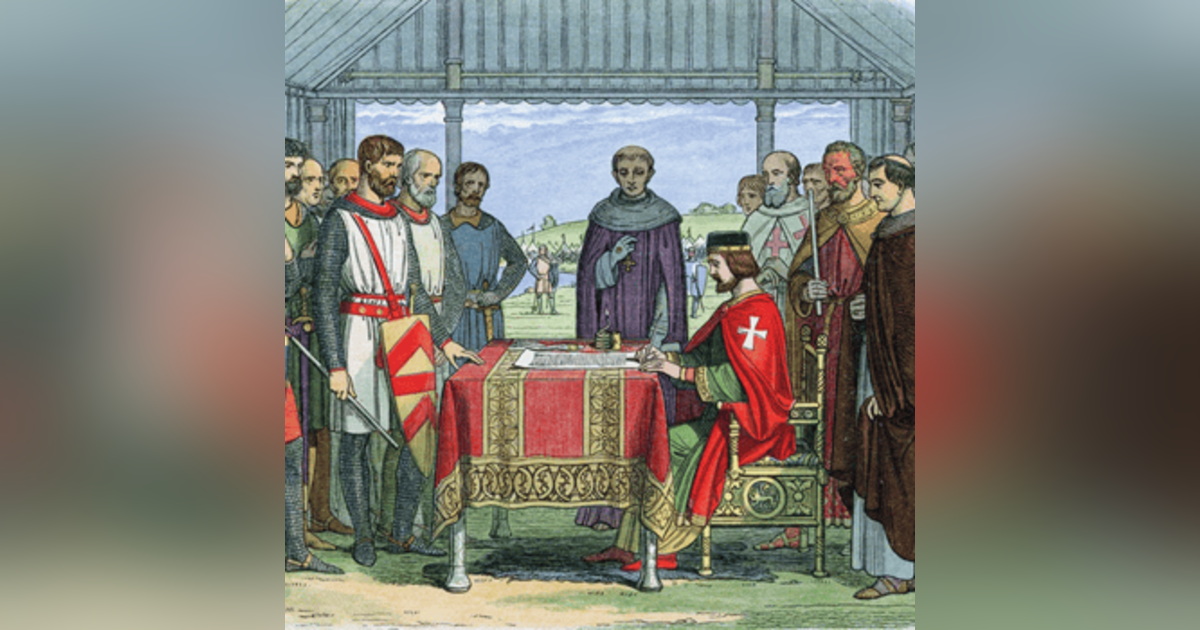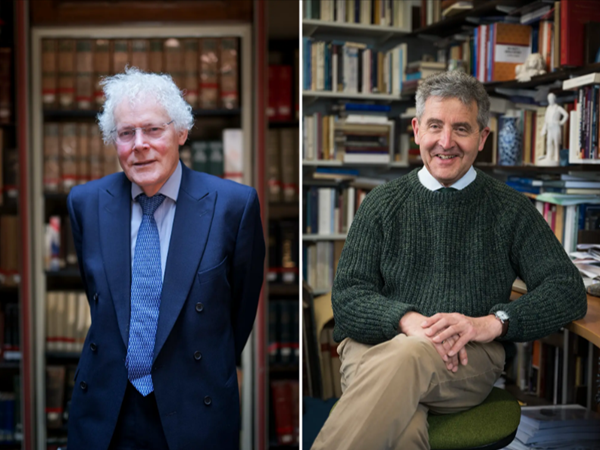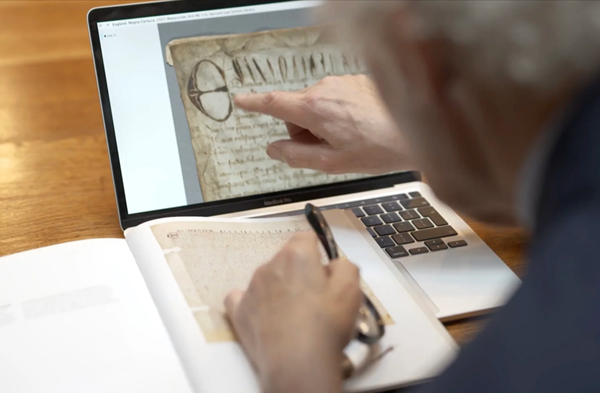The $27 Magna Carta Miracle Discovered at Harvard!

Learn how a long-overlooked "copy" of the Magna Carta turned out to be the real deal. This is one of only seven known to survive from the year 1300. Supporting links 1. Magna Carta [History] 2. The impact of Magna Carta in the 13th century [YouTube] 3. Making a key piece of history available to the world [Harvard] 4. King John of England [Wikipedia] 5. Henry III of England [Wikipedia] 6. ...
Learn how a long-overlooked "copy" of the Magna Carta turned out to be the real deal. This is one of only seven known to survive from the year 1300.
Supporting links
1. Magna Carta [History]
2. The impact of Magna Carta in the 13th century [YouTube]
3. Making a key piece of history available to the world [Harvard]
4. King John of England [Wikipedia]
5. Henry III of England [Wikipedia]
6. Magna Carta [Wikipedia]
Contact That's Life, I Swear
- Visit my website: https://www.thatslifeiswear.com
- Twitter at @RedPhantom
- Bluesky at @rickbarron.bsky.social
- Email us at https://www.thatslifeiswear.com/contact/
Episode Review
- Submit on Apple Podcast
- Submit on That's Life, I Swear website
Other topics?
- Do you have topics of interest you'd like to hear for future podcasts? Please email us
Interviews
- Contact me here https://www.thatslifeiswear.com/contact/, if you wish to be a guest for a interview on a topic of interest
Listen to podcast audios
- Apple https://apple.co/3MAFxhb
- Spotify https://spoti.fi/3xCzww4
- My Website: https://bit.ly/39CE9MB
Other
- Music ...
⏱️ 14 min read
Imagine paying $27 for a dusty old manuscript... and discovering it's a 700-year-old original of one of the most important documents in human history.
That's what happened at Harvard Law School, when the historical find was shared with the world on May 15, 2025.
It wasn't exactly like a big reveal on the tv show, Antiques Roadshow. But one day in December 2023, David Carpenter, a professor of medieval history at King's College London, was searching through the digital archives of the Harvard Law Library when he clicked on a document that would become the biggest discovery of his career.
Today you will learn how a long-overlooked "copy" of the Magna Carta turned out to be the real deal. This is one of only seven known to survive from the year 1300.
This story rewrites the rules on forgotten history, a chance discovery, and the enduring power of the rule of law.
Welcome to That's Life, I Swear. This podcast is about life's happenings in this world that conjure up such words as intriguing, frightening, life-changing, inspiring, and more. I'm Rick Barron your host.
That said, here's the rest of this story
Harvard's Hidden Treasure: Original Magna Carta Discovered in University Archives
It happened approximately a year after the end of World War II, when a modest purchase was made, that the dusty old piece of paper, revealed itself as an extraordinary historical treasure, transforming a once-overlooked manuscript in Harvard Law School's library into a document of international significance.
The faded, water-stained parchment, acquired for just $27.50 in 1946 (approximately $500 in today's currency), has now been authenticated as an original 1300 version of Magna Carta—not a mere copy as previously believed. This remarkable discovery adds an eighth manuscript to the small collection of surviving originals from that specific year. Let that moment sink in your head if you will. The significance will be revealed later in the episode.
A Chance Encounter with History
David Carpenter, professor of medieval history at King's College London, recalls the December 2023 moment when he made the stunning realization, "I never in all my life expected to discover a Magna Carta." Who would?
The discovery occurred during routine research for a book project. Professor Carpenter was at his home in Blackheath, southeast London, methodically examining Harvard Law School's digitized archives when he opened a file labeled HLS MS 172—the catalog designation for Harvard Law School Manuscript 172.
David Carpenter [left] and Nicholas Vincent [right]. Courtesy of: Harvard Law School
Carpenter explained, "I get down to 172 and it's a single parchment sheet of Magna Carta. And I think 'Oh my god, this looks to me for all the world—because I read it—like an original!'"
Excitement mounting, Carpenter immediately contacted Nicholas Vincent, professor of medieval history at the University of East Anglia. While working in a Brussels library at the time, Vincent received Carpenter's message asking, "What do you think that is?"
"I wrote back within seconds," Vincent recounted, "saying, 'You and I both know what that is!'"
Scientific Authentication
Converting initial excitement into scholarly absolute certainty required rigorous examination. Harvard Law School arranged for the document to be photographed under ultraviolet light and subjected to spectral imaging—a sophisticated technique capable of revealing features invisible to the naked eye.
The professors compared the Harvard manuscript with the six previously known originals from 1300. Multiple factors confirmed its authenticity:
· identical text
· matching dimensions (489mm x 473mm)
· and consistent scribal characteristics
· including a distinctive significant capital "E" at the beginning of "Edwardus"
· and the characteristically elongated letters in the first line
"It's the best thing that can happen to a librarian," said Amanda Watson, assistant dean at Harvard Law School's library. "This is our daily work to digitalize things, to preserve things, to save things, to open things up for people like David Carpenter."
While the document had occasionally been displayed as part of larger collections, its true significance remained unrecognized until now. The library has not determined whether it will make the Magna Carta more accessible to the public following this discovery. However, Watson indicated she "can't imagine" the institution would sell it.
Jonathan Zittrain, professor of international law and chair of the Harvard Law School library, noted the significance of such historical artifacts in the American context: "In the United States, having things that are seven hundred years old is special."
Professor David Carpenter examining the Magna Carta. Courtesy of Harvard Law School
The Bargain of the Century
The manuscript's market value is difficult to estimate, though it represents one of history's most remarkable bargains. By comparison, another 710-year-old version of Magna Carta sold at auction in 2007 for $21.3 million, which retrospectively made Harvard's $27.50 acquisition price astonishing.
The document's journey to Harvard followed a winding path through British history. Harvard Law School purchased it from London legal book dealer Sweet & Maxwell, who acquired the manuscript at a Sotheby's auction in December 1945.
The auction catalog incorrectly listed it as a copy with the wrong date (1327). It sold for £42—approximately one-fifth of the average annual income in post-war Britain—on behalf of Forster Maynard, an Air Vice-Marshal who had distinguished himself as a fighter pilot during
World War I.
Air Vice-Marshal Maynard had inherited the document from the family of Thomas and John Clarkson, prominent British abolitionists who campaigned against the slave trade from the 1780s onward.
Professor Vincent believes this manuscript could be a long-lost Magna Carta issued initially to the former parliamentary borough of Appleby-in-Westmorland in northern England. The last documented mention of this particular copy appeared in print in 1762, after which its whereabouts became unknown until now.
"The Law of the Land"
Magna Carta is Latin for "Great Charter." How many of you knew that bit of history? The document is a foundational document in developing Western legal traditions and concepts of liberty. While it has sometimes been invoked on dubious historical grounds, it has evolved into a global symbol representing the importance of fundamental freedoms, including habeas corpus, and protection against arbitrary governmental power.
One of its most celebrated passages declares: "No free man shall be seized or imprisoned, or stripped of his rights or possessions, or outlawed or exiled, or deprived of his standing in any other way, nor will we proceed with force against him, or send others to do so, except by the lawful judgment of his equals or by the law of the land."
The charter's history begins in 1215, when rebellious barons forced the unpopular King John of England—immortalized in folklore as "Bad King John"—to agree to a series of written concessions placing limits on royal authority. Though John later repudiated the document, his son Henry III issued amended versions, with the final iteration appearing in 1225. Henry's son, Edward I, subsequently confirmed the 1225 version in 1297 and 1300.
So, in simple terms:
the Magna Carta said:
- The king is not above the law.
- People have basic rights that the government must respect.
- No one should be jailed or punished without a fair trial.
- Taxes can't be taken without the consent of the people (through their representatives).
So, what is it about the Magna Carta that makes it special and more so with American history? Let’s break this down shall we:
- Foundation for Rule of Law:
The idea that leaders must obey the law helped shape the American belief that no one, not even the president, is above the law. - Influenced Key American Documents:
The Magna Carta influenced American colonists and the founding fathers when they created:
o The Declaration of Independence
o The U.S. Constitution
o The Bill of Rights
For example, the right to a fair trial, protection from unjust imprisonment, and the idea of due process all have roots in the Magna Carta.
- In a nutshell: The Magna Carta was like the first step toward democracy. It planted the seed for ideas about freedom, fairness, and limited government—ideas that grew strong in America and became the heart of its government and legal system.
In total, 25 original manuscripts of Magna Carta from various periods exist worldwide. Including the Harvard discovery, only three reside outside Britain.
Timely Significance
Nicholas Vincent noted the discovery's particular resonance given Harvard's recent experiences with political pressure.
Nicholas stated, and I quote: "In this particular instance, we are dealing with an institution that is under direct attack from the state itself, so it's almost providential it has turned up where it has at this particular time," end quote.
Vincent emphasized Magna Carta's enduring relevance in an era when democratic norms face growing challenges worldwide. The charter, he explained, establishes that the "head of state cannot simply go against somebody because he doesn't like them, he has to do it using the law."
The document's influence extends deep into American statute. Vincent pointed out that Magna Carta's text appears within 17 state constitutions across the United States, meaning "there is more of it in American state law than there is in the U.K."
Despite its fundamental importance to British history, many citizens of the United Kingdom maintain only a hazy understanding of the document. Former Prime Minister David Cameron famously failed to translate the term "Magna Carta" when questioned by David Letterman during a 2012 appearance on the American late-night talk show.
A Rare Historical Treasure
To contextualize the discovery's significance, Professor Vincent compared finding an original Magna Carta to uncovering a previously unknown masterpiece by Johannes Vermeer, the Dutch artist known for his extraordinarily limited surviving life work of just 36 paintings.
Examining the Magna Carta under various forms of ultraviolet light. Courtesy of Harvard Law School
"He is regarded as the rarest of all the great masters, so there are significantly fewer of these than there are of Vermeers," Vincent explained.
Both professors paid a visit to Harvard Law School in June of 2025, to personally examine the document—a moment Professor Vincent said was very emotional. This direct encounter with a physical artifact connecting them to medieval England represents the culmination of a scholarly journey that began with pixels on a screen and evolved into confirmation of an authentic historical treasure.
Preserving the Past, Informing the Future
Harvard's unexpected Magna Carta represents more than an antiquarian curiosity or valuable acquisition. It embodies principles that continue to shape legal systems worldwide and provides a tangible link to the long struggle for rights and freedoms that defines Western constitutional development.
The document's discovery illustrates how historical treasures can remain hidden in plain sight, awaiting the trained eye to recognize their significance. It underscores the vital importance of digitization projects that make rare materials accessible to scholars globally, without which this identification might never have occurred.
As institutions like Harvard Law School continue preserving and sharing historical documents, they ensure that foundational texts remain available for study and inspiration. The principles articulated in this 723-year-old parchment—that power must be constrained by law, that citizens deserve protection from arbitrary authority—maintain relevance across centuries of political development.
For Harvard Law School, housing one of only three Magna Carta originals outside Britain represents a tremendous responsibility and an extraordinary educational opportunity. This single sheet of aging parchment, purchased for less than the price of a modest dinner in today's currency, has transformed from an overlooked manuscript into a priceless connection to legal history's most iconic document.
What can we learn from this story? What's the takeaway?
There's a saying that Freedom Requires Vigilance.
The story reminds us that liberties enshrined centuries ago still need defending. Professor Vincent notes that the Magna Carta's message, that even leaders must act within the law, resonates especially when legal norms are tested.
In short, the rediscovery is not just about a rare artifact, it's a timely reminder that the principles of justice, rule of law, and liberty endure and often depend on the quiet but essential work of scholars, librarians, and institutions.
Well, there you go, my friends; that's life, I swear
For further information regarding the material covered in this episode, I invite you to visit my website, which you can find on Apple Podcasts for show notes and the episode transcript.
As always, I thank you for the privilege of you listening and your interest.
Be sure to subscribe here or wherever you get your podcast so you don't miss an episode.
See you soon.













